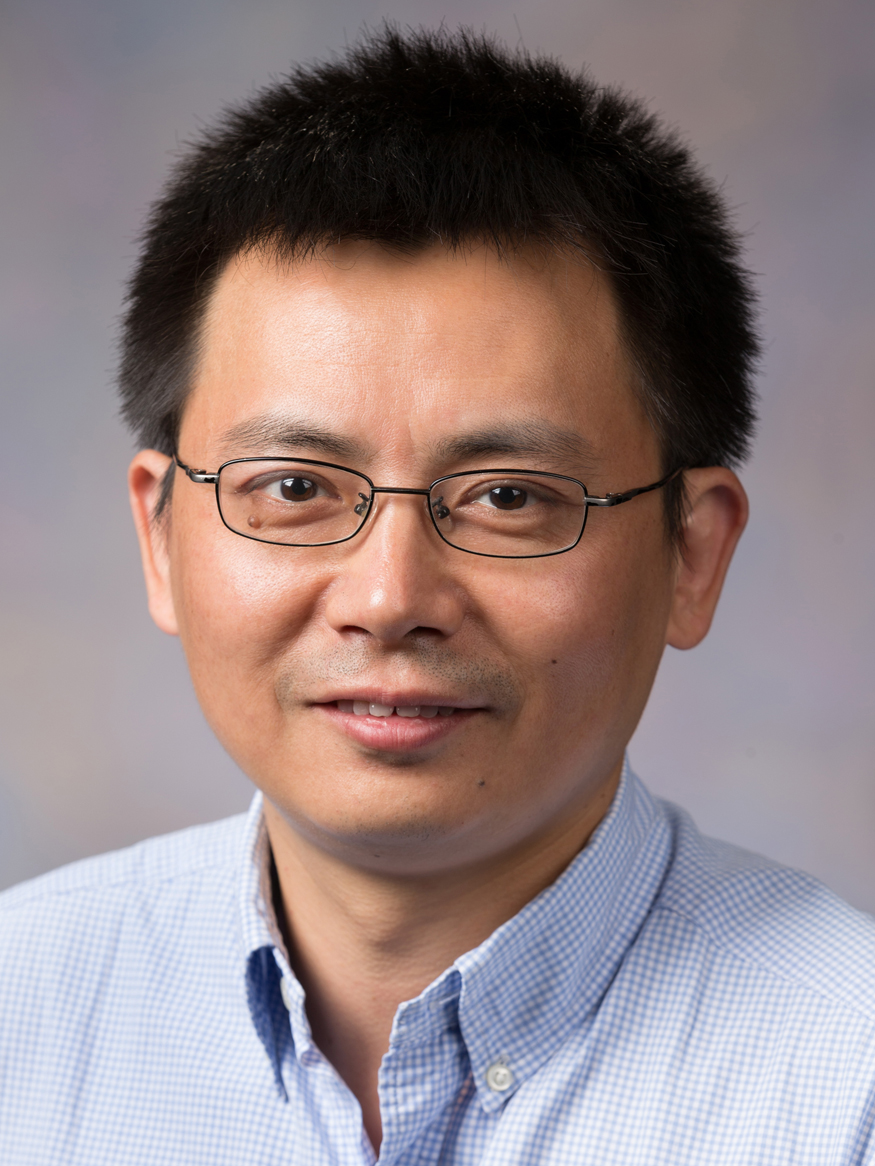Bin Gao, Ph.D.
Associate Professor of Agricultural and Biological Engineering
Institute of Food and Agricultural Sciences
2015 Awardee

Bin Gao’s research mainly lies in three areas: applying emerging technologies to improve water quality and environmental sustainability, developing high-efficiency and low-cost adsorbents for wastewater treatment and for environmental remediation, and elucidating the environmental fate and transport of emerging contaminants. Gao has developed a research program using novel methods to produce value-added engineered biochar materials from waste biomass. Findings from this research indicate that engineered biochars are not only effective sorbents to remove contaminants, but also good soil amendments to improve soil quality and productivity. This
trash-to-treasure (waste biomass-to engineered biochars) technology can introduce multiple benefits to environmental systems, including sustainable management of agricultural and environmental resources, enhanced-value products, improved soil and water quality, improved crop productivity, and carbon sequestration. Gao has developed a research program to study environmental application and implication of engineered nanoparticles (ENP). New water purification technologies based on ENP filters have been developed to remove contaminants from water. This work shows that the nano-engineered filters would be highly-efficient and cost-effective for water purification, and thus provides new solutions to impending wastewater problems. Gao has developed a research program to assess fate and transport of colloids and other emerging contaminants in hydrological pathways. Multi-scale experimentation and modeling methods have been developed to investigate the transport dynamics of natural colloids, colloid-contaminant complexes, and antibiotics in both surface and subsurface flows. The results have advanced current understanding of the environmental fate and transport of emerging contaminants and informed the development, adoption, and implementation of best management practices and regulation tools for pollution control.
 Bin Gao’s research mainly lies in three areas: applying emerging technologies to improve water quality and environmental sustainability, developing high-efficiency and low-cost adsorbents for wastewater treatment and for environmental remediation, and elucidating the environmental fate and transport of emerging contaminants. Gao has developed a research program using novel methods to produce value-added engineered biochar materials from waste biomass. Findings from this research indicate that engineered biochars are not only effective sorbents to remove contaminants, but also good soil amendments to improve soil quality and productivity. This trash-to-treasure (waste biomass-to engineered biochars) technology can introduce multiple benefits to environmental systems, including sustainable management of agricultural and environmental resources, enhanced-value products, improved soil and water quality, improved crop productivity, and carbon sequestration. Gao has developed a research program to study environmental application and implication of engineered nanoparticles (ENP). New water purification technologies based on ENP filters have been developed to remove contaminants from water. This work shows that the nano-engineered filters would be highly-efficient and cost-effective for water purification, and thus provides new solutions to impending wastewater problems. Gao has developed a research program to assess fate and transport of colloids and other emerging contaminants in hydrological pathways. Multi-scale experimentation and modeling methods have been developed to investigate the transport dynamics of natural colloids, colloid-contaminant complexes, and antibiotics in both surface and subsurface flows. The results have advanced current understanding of the environmental fate and transport of emerging contaminants and informed the development, adoption, and implementation of best management practices and regulation tools for pollution control.
Bin Gao’s research mainly lies in three areas: applying emerging technologies to improve water quality and environmental sustainability, developing high-efficiency and low-cost adsorbents for wastewater treatment and for environmental remediation, and elucidating the environmental fate and transport of emerging contaminants. Gao has developed a research program using novel methods to produce value-added engineered biochar materials from waste biomass. Findings from this research indicate that engineered biochars are not only effective sorbents to remove contaminants, but also good soil amendments to improve soil quality and productivity. This trash-to-treasure (waste biomass-to engineered biochars) technology can introduce multiple benefits to environmental systems, including sustainable management of agricultural and environmental resources, enhanced-value products, improved soil and water quality, improved crop productivity, and carbon sequestration. Gao has developed a research program to study environmental application and implication of engineered nanoparticles (ENP). New water purification technologies based on ENP filters have been developed to remove contaminants from water. This work shows that the nano-engineered filters would be highly-efficient and cost-effective for water purification, and thus provides new solutions to impending wastewater problems. Gao has developed a research program to assess fate and transport of colloids and other emerging contaminants in hydrological pathways. Multi-scale experimentation and modeling methods have been developed to investigate the transport dynamics of natural colloids, colloid-contaminant complexes, and antibiotics in both surface and subsurface flows. The results have advanced current understanding of the environmental fate and transport of emerging contaminants and informed the development, adoption, and implementation of best management practices and regulation tools for pollution control.

